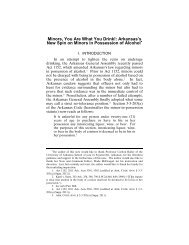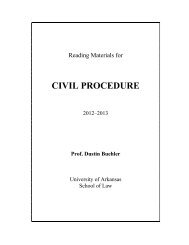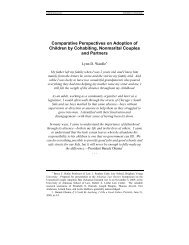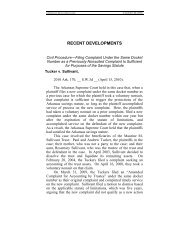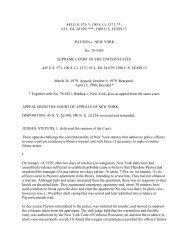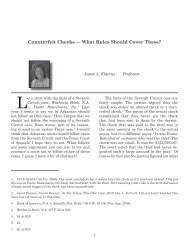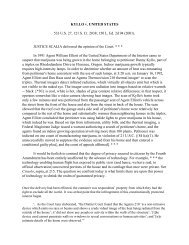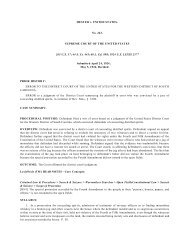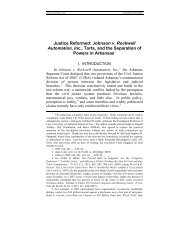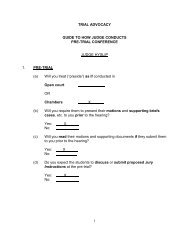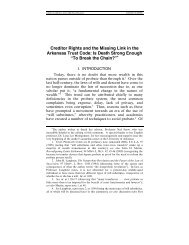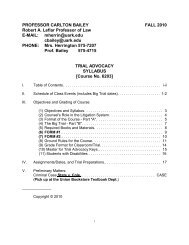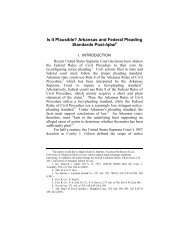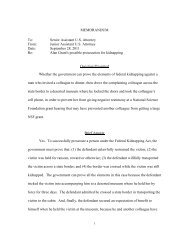Facebook Discovery and the Unbearable Sameness of Internet Law
Facebook Discovery and the Unbearable Sameness of Internet Law
Facebook Discovery and the Unbearable Sameness of Internet Law
You also want an ePaper? Increase the reach of your titles
YUMPU automatically turns print PDFs into web optimized ePapers that Google loves.
68 ARKANSAS LAW REVIEW [Vol. 65:39<br />
Indeed, logging in to someone else’s account to gain<br />
information from it, even with <strong>the</strong> user’s acquiescence, may be<br />
more than an invasion <strong>of</strong> <strong>the</strong> user’s privacy; it is conceivably<br />
also a crime. Under <strong>the</strong> Computer Fraud <strong>and</strong> Abuse Act, it is a<br />
misdemeanor to intentionally exceed authorized access to a<br />
protected computer <strong>and</strong> obtain information from it. 133 A<br />
“protected computer” is essentially any computer connected to<br />
<strong>the</strong> <strong>Internet</strong>. 134 And several prosecutors <strong>and</strong> courts have taken<br />
<strong>the</strong> position that it “exceeds authorized access” to access a<br />
computer after having violated any contractual provision<br />
governing its use, including form terms <strong>of</strong> service. 135 <strong>Facebook</strong>,<br />
for example, prohibits its users in its terms <strong>of</strong> service from<br />
sharing <strong>the</strong>ir passwords, allowing o<strong>the</strong>rs to access <strong>the</strong>ir<br />
accounts, or soliciting login information or accessing someone<br />
else’s accounts. 136 <strong>Facebook</strong> users who obtain a password from<br />
ano<strong>the</strong>r user in violation <strong>of</strong> <strong>Facebook</strong>’s terms are <strong>the</strong>refore<br />
arguably “exceeding authorized access” to <strong>Facebook</strong>’s servers,<br />
<strong>and</strong> if <strong>the</strong>y obtain information in doing so, <strong>the</strong>reby committing a<br />
federal misdemeanor. 137<br />
IV. CONCLUSION<br />
The treatment <strong>of</strong> social-networking sites during discovery<br />
is an example <strong>of</strong> <strong>Internet</strong> law in action: <strong>the</strong> application <strong>of</strong> an<br />
existing body <strong>of</strong> doctrine to a pr<strong>of</strong>oundly new technological <strong>and</strong><br />
sociological set <strong>of</strong> circumstances. There may be valuable<br />
lessons in how courts have responded to that challenge,<br />
133. 18 U.S.C. § 1030(a)(2) (2006). Violation <strong>of</strong> § 1030(a)(2) is punishable by a fine<br />
or imprisonment for not more than one year, or both. 18 U.S.C. § 1030(c)(2)(A) (2006).<br />
134. See United States v. Drew, 259 F.R.D. 449, 456 (C.D. Cal. 2009).<br />
135. See United States v. Nosal, 642 F.3d 781, 784 (9th Cir. 2011); United States v.<br />
Rodriguez, 628 F.3d 1258, 1263 (11th Cir. 2010); Drew, 259 F.R.D. at 456 (C.D. Cal.<br />
2009) (finding prosecution’s <strong>the</strong>ory void for vagueness).<br />
136. Statement <strong>of</strong> Rights <strong>and</strong> Responsibilities, FACEBOOK (Apr. 26, 2011), http://<br />
www.facebook.com/legal/ terms.<br />
137. To be sure, <strong>the</strong>re is a persuasive argument that it is incorrect as a matter <strong>of</strong><br />
ei<strong>the</strong>r statutory interpretation or constitutional limits <strong>of</strong> due process to interpret <strong>the</strong><br />
Computer Fraud <strong>and</strong> Abuse Act as criminalizing violations <strong>of</strong> form user agreements. See<br />
Orin S. Kerr, Vagueness Challenges to <strong>the</strong> Computer Fraud <strong>and</strong> Abuse Act, 94 MINN. L.<br />
REV. 1561, 1562 (2010); Orin S. Kerr, Cybercrime’s Scope: Interpreting “Access” <strong>and</strong><br />
“Authorization” in Computer Misuse Statutes, 78 N.Y.U. L. REV. 1596, 1598-99 (2003).<br />
The point here is simply that <strong>the</strong> matter is currently unresolved in <strong>the</strong> federal courts,<br />
placing civil litigants at some nontrivial risk <strong>of</strong> criminal liability when <strong>the</strong>y access an<br />
account pursuant to court-authorized discovery.



